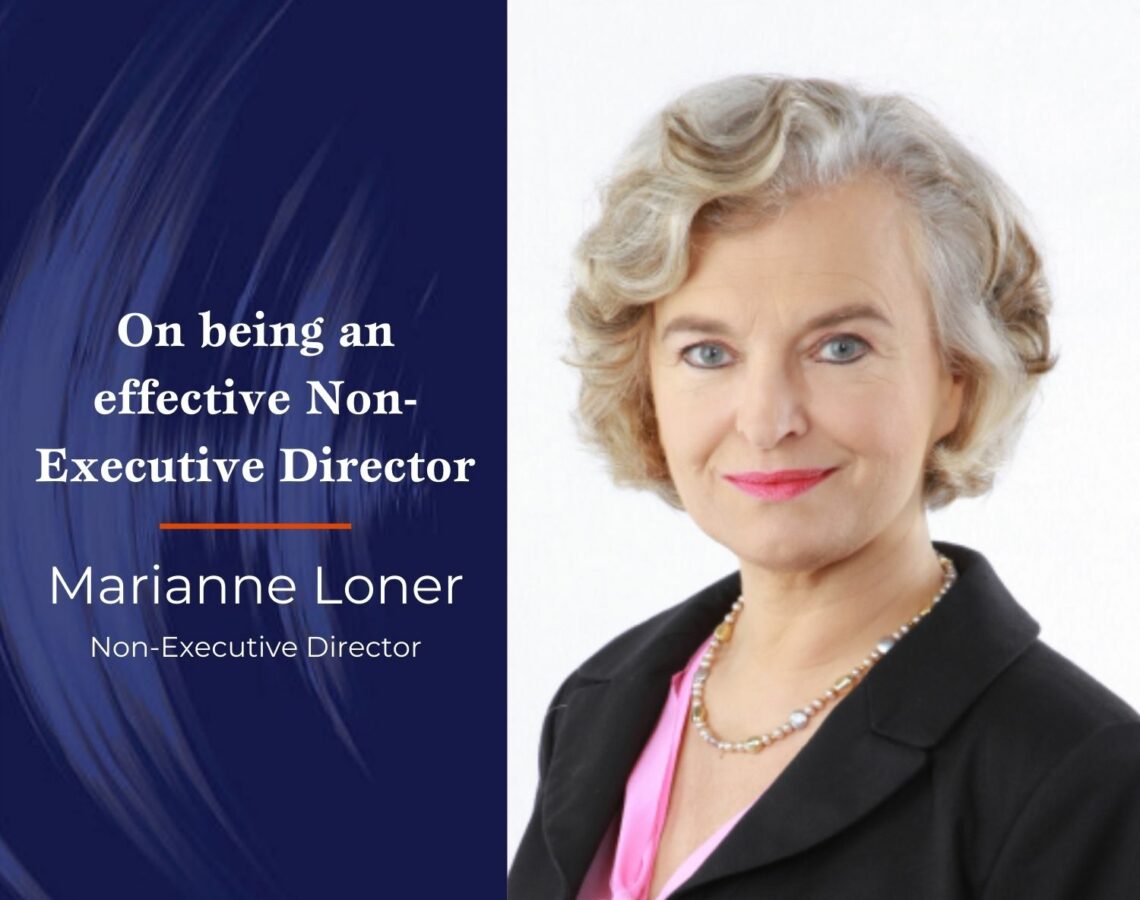On being an effective Non-Executive Director

One of the most frequently asked questions to Better Boards is, “What does it take to be an effective Non-Executive Director?” This podcast will shed some light on the topic.
One of the most frequently asked questions to Better Boards is, “What does it take to be an effective Non-Executive Director?” This podcast will shed some light on the topic.
In this podcast, Dr. Sabine Dembkowski, Founder and Managing Director of Better Boards, discusses how to be an effective Non-Executive Director with Marianne Loner. Marianne spent 35 years in an executive career in investment banking, commercial lending, and asset management in London, New York, Chicago, and Zurich with global organizations. For the past 12 years, she has served on Boards in Latin America, the Caribbean, and Europe.
Some of the key takeaways of the conversation include:
“Time flies when you are having fun!”
Marianne takes her work on boards very seriously. Still, she says there’s no doubt that after a long and successful executive career, bringing her expertise to the companies she serves has been gratifying. She also focuses on emerging markets to quickly make a visible difference with ESG and economic development in multiple countries.
“If you’re in one industry, you end up having very strong content”
Marianne says that while she works all around the world, by keeping her focus on one industry – financial services – she can be more effective. She can come into a company with a deep understanding of the regulatory frameworks and how firms can make the changes needed to innovate and be truly client-focused.
“No one country has a monopoly on best practices”
Marianne explains that governance and best practices can be very different between countries, which board members who stay in one region or country miss out on experiencing. Thanks to her global focus, she can make connections and see how different policies play out in different cultural and economic environments. This gives her a unique perspective on best practices for any given firm and allows her to bring more diversity of thought and application to her board work.
“Have a clear idea what you bring to the party”
To be an effective Non-Executive Director, Marianne feels that board members should have a clear picture of what they’re bringing to the role. How are you being expected to contribute? What role do you play in the dynamics of the board, decision-making, and company culture? Marianne recommends new Non-Executive Directors spend time actively listening and gaining an understanding of the company so that they can develop an effective personal strategy for influencing and shaping decisions, strategy, and tactics.
In financial services, Marianne notes that the rapid pace of change over the last decade requires that board members commit to staying current with the latest trends and technologies. While the financial services industry doesn’t have the supply chain issues of other industries, cross-border developments, and political environments can have a major impact. Leaning on a historical perspective alone may not be enough to navigate this. However, by combining depth of experience with a deep understanding of the newest tools and macro trends, board members can more effectively contribute to long-term strategy development.
“I read the entire pack, even footnotes!”
Board effectiveness depends on adequate preparation. Marianne has seen boards where members are not reading all the materials being provided, which she feels places them at a disadvantage in their contribution. To be an effective contributor, it is vital for her to read every part of board packets, with a special focus on matters arising.
Marianne takes notes on key issues and seeks out additional conversations, well before the scheduled board session, with other board members on issues where she’s not clear or where there’s likely to be controversy. This helps her clarify what to focus on during the board meetings and helps prevent the whole board from bogging down in operational issues or falling behind when faced with a lengthy agenda. She uses her preparation process to ensure her contributions are less about quantity and more about quality.
“Hindsight is important for tackling issues that are still unresolved”
Marianne knows that the mandate for board members is to provide insight, oversight, and foresight. However, hindsight can be useful when issues aren’t resolved, provided that the whole board meeting isn’t consumed by hindsight. Marianne also sees great value in conversations among board members between meetings to ensure that key issues are being raised, that initiatives are moving forward, and that everyone is clear on what is supposed to be happening for follow-up and strategic advancement of board recommendations. While some might expect CEOs to drive these conversations, this doesn’t always happen, and Marianne finds it useful to take ownership of initiating and continuing these conversations.
The three top takeaways from our conversation are:
- You cannot operate in a vacuum. To be effective, spend the time to build relationships with other board members and management.
- Silence does not serve the business. Have courage and stand up for what you think is right.
- To be effective, understand the details of the business but let management do their job so that you can keep a strategic focus and long-term viewpoint.
Please contact sabine.dembkowski@better-boards.com for a copy of the full text blog.
Don’t forget to subscribe never to miss an episode of the Better Boards Podcast Series. Available on Apple, Spotify or Google.
To find out how you can participate in the Better Boards Podcast Series or more information on Better Boards’ solutions, please email us at info@better-boards.com.



